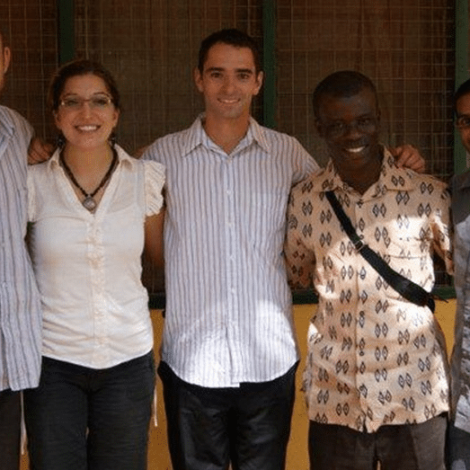Does Malawi really need more water pumps? George Roter posed the question in his TEDx Toronto talk after telling a story about a village in Malawi where a newly broken pump rusts in the shadow of an older broken pump. Roter helped found Engineers Without Borders Canada in 2000, he has been its chief executive officer since 2011, and in that time, he and his organization have helped to transform old aid models, make failure popular, and ask good questions about pumps.
One of the problems in old aid models has been a myopic focus on single points within a system, such as a well that needs a water pump. The solution might be to gain a wider view of the system to address the underlying problems. As Roter says, instead of new pumps, maps that help repair teams locate broken pumps might make for a longer-term solution. So, in Malawi, Roter and his engineer colleagues have since become map makers, not pump builders.
Here, Roter tells us why some farmers need to quit farming, what developing countries can teach the West about technology, and about a common trap for development engineers with good intentions. We asked him five questions.
Developing countries can show the rest of the world how to let go of grandfathered technology and technology implementation, to leap-frog to something more flexible and efficient.
E4C:What is one of the dead ends in engineering for development that people just won’t let die?
GR: The dead end is actually an approach I call “helicopter design” (I might also refer to it as “nostalgia for design projects past”). It goes something like this: A developing community, often through a member of the diaspora, gets in touch with an engineer or engineering group in a rich country with a vague need – our school has no lights, or something similar.
After either a short assessment trip to the community, or sometimes just a few phone conversations, the engineers get to it. They come together in a basement or garage or lab, and get incredibly excited about coming up with the best lighting system they can think of for this community. They will take design constraints from limited interaction with the community, have a list of appropriate technology principles pinned up on the wall, and out will come an ingenious design and project plan. Implementation happens with a one- to two-week trip to the community, where “the locals” pitch in with labour to make the engineers’ design come to life. Before departing, a picture is taken with the school lights blazing, the engineering team smiling, and school kids reading at their desks with light “for the first time ever.”
There are so many things wrong with this approach:
- It fundamentally starts from the place of “What do we have to give,” which is engineering design, versus “What is truly needed?”
- It avoids bigger and broader questions, like why the school had no lights in the first place, or what is happening more broadly in the education system in that country.
- It starts analysis at the organizing unit size of “community” rather than “household”, which generally assumes homogeneity and itself is a bit patronizing.
- It gives short-shrift to any long-term considerations – there might be some training or a school committee created, but local government is only peripherally involved and very little time is spent on building business models.
- And finally, it’s pure we-the-rich-are-helping-you-the-poor charity, in which the helpers are lauded for altruism, but generally avoid addressing larger issues like social justice and global inequity.
While I understand why this approach is so compelling for engineers, how it feeds our passions and creativity, and that it’s ultimately coming from a place of good intentions, it’s time to let it die!
In Zambia or Kenya or Burkina Faso, engineers are revered and seen as leaders. And they rise to the occasion, framing important issues for citizens and policy makers to consider. Engineers in Canada can certainly learn from that.
E4C: Twenty years from now, what will the work of engineers in EWB Canada and other like-minded organizations look like?
GR: To borrow a framing from my good friend and longtime EWBer Levi Goertz, in 20 years I’d like to make three phone calls:
First, I’ll call up the President of Zambia, who will take my call! She’ll tell me all about the global collaboration she’s heading up on leadership – in engineering, politics, academia – that was inspired by EWB’s work in forming global, multi-disciplinary teams of people to tackle substantial issues.
Second, I’ll call the CEO of Suncor Energy, who will tell me about how the partnership with EWB on intrapraneurship has allowed them to be the first energy company in Canada with a zero carbon footprint and leading the transition to a renewable energy economy.
Third, I’ll call one of the thousands of new EWBers, who just got involved in the organization at University or high school, and he or she will be fired up – as that person would be today – about creating change in their communities and globally, with a dozen ideas that will continue driving EWB to evolve and grow.
E4C: EWB Canada’s philosophy seems to downplay technologies in favor of systemic change. But, just for fun, is there a new technology in developing economies that you’re excited about?
GR: First, I should make it clear: EWB Canada recognizes that technology is necessary for reducing poverty and increasing equity. However, it is extremely rare that technology alone is transformative. Take something like mobile phone and data networks, something I am truly excited about in sub-Saharan Africa. The technology itself is neat – I love watching YouTube videos on my laptop that is tethered to my phone, while driving out in rural Canada or rural Ghana! But it’s even more exciting to see a clever model for increasing citizens’ power built on this technology. For example, an EWB-supported venture called Voto Mobile that increases two-way communication between people and the institutions that are meant to serve them.
E4C: What can developing countries teach the rest of the world about technology and design?
GR: It sounds cliche, but developing countries can show the rest of the world how to let go of grandfathered technology and technology implementation, to leap-frog to something more flexible and efficient. Why bother maintaining a costly network of banks and using cash or credit cards, when a smart mobile phone enabled payment network like M-Pesa in Kenya can replace all that bricks and mortar and cash? Why have cataract surgery in expensive, large hospitals when you can have highly efficient, specialized clinics like Aravind Eye Centres at a fraction of the cost? Why continue to build hulking centralized power production when efficient, distributed generation can be more flexible and have lower emissions?
A lot of these lessons come down to policy and societal expectations. And that leads to something else that developing country engineers can teach engineers in the rest of the world: Take leadership. In Zambia or Kenya or Burkina Faso, engineers are revered and seen as leaders. And they rise to the occasion, framing important issues for citizens and policy makers to consider. Engineers in Canada can certainly learn from that.
E4C: Okay, let’s go out with a bang: What is one of your most controversial opinions?
GR: You mean more controversial than any above?! Here’s one that can get me in trouble sometimes: I think that 20-50 percent of all smallholder farmers in Sub-Saharan Africa should probably not be running their own farms. They are the people who don’t like farming and aren’t any good at it. But they don’t have any choice right now, and so many aid programs provide incentives for them to continue farming. There are huge issues of power in many of the solutions (i.e. renting land to better farmers who run larger farms could result in greater inequality), but I simply don’t see how the increase in agricultural quality and productivity that countries across Sub-Saharan Africa desire is possible without a whole lot of the less motivated farmers no longer planning and tending their land.

